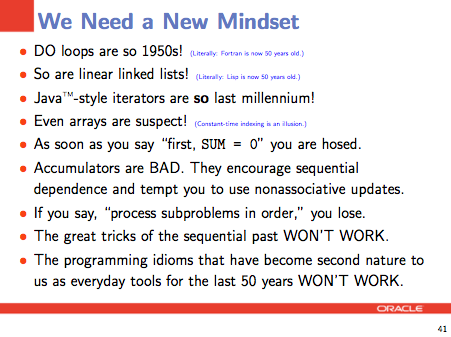I attended three conferences in October 2010, the most of any month of my life to date. Others have posted extensively about all three events, so I’ll link to a few posts and point out highlights for me.
Business of Software 2010
BoS alternates between San Franscisco and Boston; this year it was in Boston. There are plenty of excellent summaries online (here, here, here, here), and an especially nice set of photos here.
The conference was packed full of great speakers, mostly well known. I am sure the most “expensive” person in the lineup was Seth Godin; he is an excellent speaker and had interesting content, but wasn’t as relevant to me as some of the others.
The high point of BoS was Joel Spolsky’s closing talk. Unlike everyone else, he used no slides, and simply sat at a table to tell us the story of his last year or so. I was a bit surprised at his public airing of partner grievances, but that was probably necessary to tell the (very worthwhile) story of his transition over the last year from the “small, profitable company” model to the “go big” model. The former can make good money; but only the latter can make a broad impact to build a (perhaps slightly) better world.
I also especially enjoyed Erik Sink and Derek Sivers telling the stories of their company sales. My own company sale experience was more like Erik Sink’s.
In the past, Business of Software has posted the videos for year N during the marketing runup for year N+1; I suspect the same will happen this time. When those videos appear, watch them. Especially keep an eye out for Joel’s criticism of Craigslist, with which I agree.
Strange Loop 2010
Strange Loop is held in, and named after, the Delmar Loop area which spans University City and a bit of St. Louis. The 2010 event was much larger than the 2009 event; I don’t know whether it will be possile to accomodate 2011’s crowd in the Loop area or not; I’ll certainly attend either way.
Again there are plenty of summaries online, including here and here.
The highlight of this event for me was Guy Steele’s talk on parallelism. Unlike some commenters, I greatly enjoyed both the first half of the talk (a stroll through some ancient IBM assembly code) and the second half (including the Fortress example code). I’ve been inspired by this talk and criticism about it to put together my own upcoming code-centric talks, in which I’ll touch on the key parallelism ideas briefly, then step through several code examples in various languages.
I also spoke at Strange Loop, in a 20 minute slot, on Lua (video). Most of the feedback on my talk was positive, particularly of the “why, not how” approach I used to make the best use of 20 minutes. A few people would have preferred a longer talk with more “how”; I might put together such a presentation at a later date.
Disclosure: Oasis Digital sponsored Strange Loop.
(first clojure-conj)
At Clojure Conj I had the strong impression of being at the start of something big. I believe that Clojure, in spite of the needlessly-feared parentheses, has more “legs” than any other of the current crop of ascendant languages: getting state right (and thus making it possible to get parallelism right) is more important than syntax. Based on the folks I met at the Conj, I’d say Clojure has exactly the right early adopters on board.
As usual plenty of others have posted detailed notes (here, here, here, here, here).
The talk that stands out most to me was not exactly about Clojure. Rich Hickey’s keynote was about the importance and process of thinking deeply about problems to create a solution. In a sense this is the counterpoint to agile, rapid-iteration development, suitable to a different class of problems. Clojure exudes a sense of having been thought about in depth, and Rich is obviously the #1 deep thinker. When this arrives on video, watch it. Twice.
I also enjoyed Rich’s impromptu Go clinic at the pre-conference speaker (and sponsor) dinner. Note that Go has totally different rules from the similarly named Go-Moku, and is not to be confused with Google’s Go language.
Disclosure: Oasis Digital sponsored Clojure Conj.
Back to Work
I’ve had very little time for my own projects this month; between the events, most of my available hours were occupied with Oasis Digital customers. My mind is bursting with worthwhile ideas to pursue.

